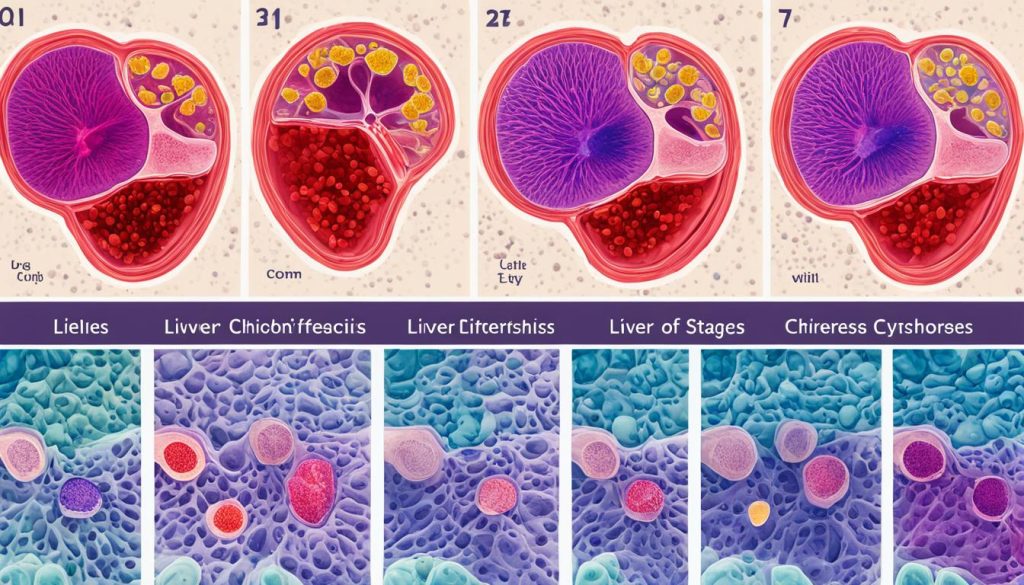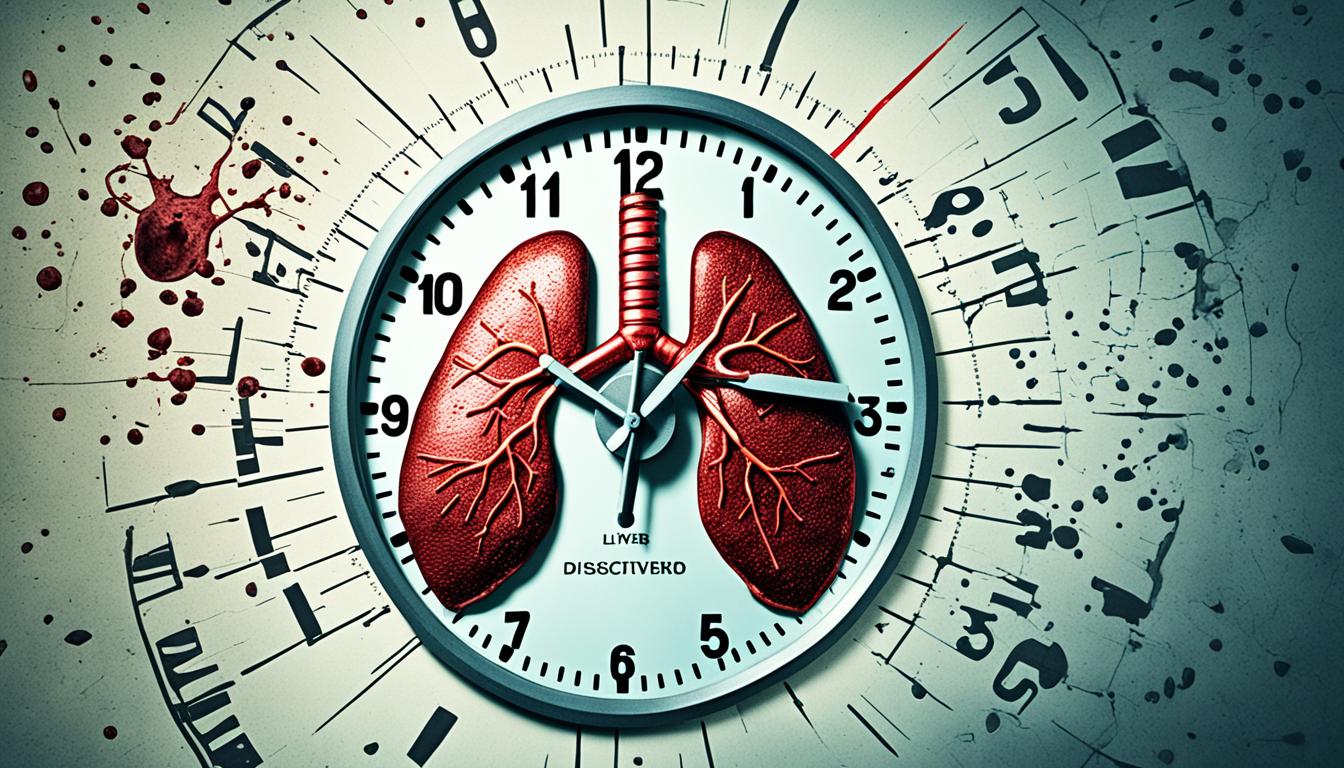Cirrhosis of the liver is a serious condition that can lead to scarring and permanent damage. Life expectancy with cirrhosis depends on the stage and type of the condition. On average, a person with cirrhosis of the liver may have a life expectancy of 2 to 12 years. However, this can vary depending on factors such as the individual’s treatment and management of the condition.
There are two stages of cirrhosis: compensated and decompensated. People with compensated cirrhosis, where symptoms are not yet present, generally have a life expectancy of 9 to 12 years. Those with decompensated cirrhosis, where symptoms and complications are present, have a significantly reduced life expectancy of about 2 years.
Various scoring systems, such as the Child-Turcotte-Pugh (CTP) system and the Model for End-Stage Liver Disease (MELD) score, are used to assess the severity of cirrhosis and predict survival rates.
Understanding the life expectancy of cirrhosis of the liver and its various stages can help individuals and their healthcare providers make informed decisions about treatment and management options. In the following sections, we will delve deeper into the factors that can affect life expectancy, discuss treatment options, and provide tips for living with cirrhosis of the liver.
Factors Affecting Life Expectancy with Cirrhosis of the Liver
The stage of cirrhosis of the liver can have a significant impact on life expectancy. Understanding the different liver cirrhosis stages and their implications is essential for managing the condition effectively.
Compensated Cirrhosis: At this stage, individuals may not experience any symptoms. The liver is still functioning adequately despite the presence of scar tissue. People with compensated cirrhosis generally have a better prognosis and can expect a life expectancy of 9 to 12 years.
Decompensated Cirrhosis: In this advanced stage, symptoms and complications become more apparent as the liver’s ability to function declines. Life expectancy for individuals with decompensated cirrhosis is significantly reduced to around 2 years. It is crucial to address complications promptly to improve outcomes.
Complications of cirrhosis, such as portal hypertension leading to varices (enlarged veins) and ascites (accumulation of fluid in the abdomen), can further impact life expectancy. Early diagnosis and effective management of these complications are key to enhancing the quality of life for individuals with cirrhosis.
In some cases, a liver transplant may be necessary for individuals with decompensated cirrhosis to have a chance at prolonged survival. A liver transplant involves replacing the damaged liver with a healthy liver from a deceased or living donor.

Treatment and Management for Prolonged Life with Cirrhosis of the Liver
While cirrhosis of the liver cannot be reversed or cured, there are several treatment and management options available that can help slow down its progression and improve life expectancy. The primary focus is on managing the underlying cause of cirrhosis, whether it is alcohol cessation, antiviral medications for viral hepatitis, or other appropriate treatments.
In addition to medical intervention, adopting certain lifestyle changes can contribute to a better prognosis for individuals with cirrhosis. Maintaining a healthy diet, rich in nutrients and low in sodium and fats, can help support liver function. Regular exercise, tailored to an individual’s capabilities, can improve overall fitness and reduce the risk of complications. Quitting smoking is also highly recommended, as smoking can worsen liver damage and increase the risk of complications.
Managing cirrhosis symptoms is an essential part of treatment. Medications may be prescribed to alleviate specific symptoms and address complications. Diuretics, for example, can help reduce excess fluid accumulation in the body, relieving symptoms such as swelling and discomfort. Beta-blockers may be prescribed to reduce portal hypertension and lower the risk of variceal bleeding. In severe cases, a liver transplant may be considered as a potential treatment option.
Regular monitoring and early intervention are crucial for individuals living with cirrhosis. Routine check-ups and tests can help detect and address any changes or complications in a timely manner. Close collaboration with healthcare providers is essential to ensure optimal management and to make any necessary adjustments to the treatment plan.
How Long Can You Live With Cirrhosis of the Liver?
Living a long, normal life with cirrhosis is possible with proper treatment, management, and lifestyle modifications. While the condition is chronic and progressive, individuals who effectively manage their cirrhosis can experience a relatively good quality of life and prolonged survival.
It is important to remember that each case of cirrhosis is unique, and the outcomes can vary depending on several factors. Adhering to medical advice, following treatment plans, and making necessary lifestyle changes can significantly improve the prognosis and overall well-being of individuals with cirrhosis.

Outlook and Prognosis for Cirrhosis of the Liver
Cirrhosis of the liver is a serious condition that requires careful management for a positive outlook. The end stage of cirrhosis, known as decompensated cirrhosis, is characterized by the presence of symptoms and complications. At this stage, the average life expectancy is around 2 years. However, individuals with compensated cirrhosis can have a significantly longer life expectancy of 9 to 12 years.
While cirrhosis is a progressive disease, there is hope for prolonging life and improving quality of life. Effective management of the condition, including treating any underlying causes, is crucial. Early intervention and addressing complications as soon as they arise can make a significant difference in prognosis and overall well-being.
Seeking appropriate medical care and following recommended treatment plans are essential for individuals living with cirrhosis of the liver. Additionally, making lifestyle changes such as avoiding alcohol, maintaining a healthy diet, and exercising regularly can contribute to better outcomes.
Is there hope for liver cirrhosis? Absolutely! While cirrhosis is a serious condition, with proper management and care, individuals can lead fulfilling lives and enjoy a better prognosis. It’s important to remain proactive in managing the condition, following medical advice, and making necessary lifestyle changes.

Regular monitoring, active participation in treatment plans, and a supportive healthcare team can provide the needed support and guidance throughout the journey with cirrhosis of the liver. Remember, each person’s experience with cirrhosis may vary, and it’s crucial to work closely with healthcare professionals to develop an individualized management plan.
| Factors | End-Stage Cirrhosis (Decompensated) | Compensated Cirrhosis |
|---|---|---|
| Average Life Expectancy | Approximately 2 years | 9 to 12 years |
| Management and Prognosis | Requires close monitoring, intervention, and addressing complications promptly | Regular monitoring and management for underlying causes and complications to maintain a better prognosis |
| Lifestyle Changes | Crucial, including alcohol avoidance, healthy diet and exercise | Important for maintaining overall health and managing cirrhosis |
Tips for Living with Cirrhosis of the Liver
Cirrhosis of the liver is a serious condition that is generally considered irreversible once significant scarring has developed. However, there are certain lifestyle changes and treatments that can help slow down the progression of cirrhosis and improve quality of life. Here are some tips to help you live well with cirrhosis:
1. Avoid Alcohol Completely
For individuals with cirrhosis caused by alcohol abuse, completely avoiding alcohol is essential. Continued alcohol consumption can further damage the liver and worsen the condition. It’s important to seek support from healthcare professionals and support groups to help you maintain sobriety.
2. Manage Underlying Causes
Depending on the underlying cause of cirrhosis, there may be treatments available to prevent further liver damage. In the case of viral hepatitis, antiviral medications can help prevent the progression of the disease and minimize liver damage. It’s crucial to work closely with your healthcare provider to manage the underlying cause effectively.
3. Adopt a Healthy Lifestyle
Living a healthy lifestyle can help improve outcomes for individuals with cirrhosis of the liver. Regular exercise, such as walking or swimming, can help improve overall fitness and maintain a healthy weight. It’s also important to follow a balanced diet that includes fruits, vegetables, whole grains, and lean proteins. Quitting smoking is strongly advised as smoking can further harm the liver.
4. Get Regular Check-ups
Regular check-ups with your healthcare provider are crucial for monitoring the progression of cirrhosis and managing any complications. These check-ups allow your healthcare provider to assess your liver function, monitor for any signs of liver failure, and adjust your treatment plan accordingly.
5. Liver Transplant Evaluation
In severe cases of cirrhosis, a liver transplant may be an option. If your healthcare provider determines that a liver transplant may be necessary, they will refer you for a transplant evaluation. This evaluation will assess your overall health and determine your eligibility for a liver transplant. It’s important to follow the recommendations of your healthcare provider during the evaluation process.
While the liver may not fully recover from cirrhosis, making positive lifestyle changes and following medical advice can help improve overall health and well-being. By avoiding alcohol, managing underlying causes, adopting a healthy lifestyle, getting regular check-ups, and considering a liver transplant if necessary, individuals with cirrhosis of the liver can optimize their quality of life and enhance their prognosis.

| Tips for Living with Cirrhosis of the Liver |
|---|
| Avoid alcohol completely |
| Manage underlying causes |
| Adopt a healthy lifestyle |
| Get regular check-ups |
| Liver transplant evaluation |
Conclusion
Cirrhosis of the liver is a serious condition that can significantly impact life expectancy. The stage of cirrhosis and effective management of the underlying causes and complications play a crucial role in determining outcomes. While the prognosis for advanced cirrhosis is poor, individuals with early-stage cirrhosis and proper treatment can have a relatively longer life expectancy.
It is important to work closely with healthcare providers, follow treatment plans, and make necessary lifestyle changes to improve quality of life and prolong survival. Managing the underlying cause of cirrhosis, such as alcohol cessation or antiviral medications for viral hepatitis, is essential. Additionally, adopting a healthy lifestyle, including maintaining a balanced diet, regular exercise, and avoiding smoking, can contribute to better outcomes.
Regular monitoring and early intervention for complications of cirrhosis are essential for prolonging life. Medications and procedures may be used to manage symptoms and reduce the risk of further liver damage. While cirrhosis of the liver cannot be reversed or cured, prompt and appropriate medical care can improve overall health and well-being.




